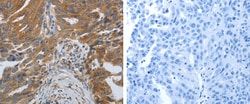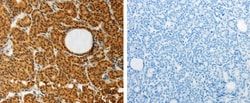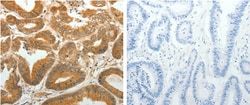SPAG1 Polyclonal Antibody, Invitrogen™
Manufacturer: Thermo Scientific
Select a Size
| Pack Size | SKU | Availability | Price |
|---|---|---|---|
| Each of 1 | PA549729-Each-of-1 | In Stock | ₹ 46,502.50 |
PA549729 - Each of 1
In Stock
Quantity
1
Base Price: ₹ 46,502.50
GST (18%): ₹ 8,370.45
Total Price: ₹ 54,872.95
Antigen
SPAG1
Classification
Polyclonal
Conjugate
Unconjugated
Gene
SPAG1
Gene Alias
CILD28; CT140; epididymis secretory protein Li 268; HEL-S-268; HSD-3.8; Infertility-related sperm protein Spag-1; SP75; SPAG1; sperm associated antigen 1; sperm-associated antigen 1; sperm-associated antigen 1; LOW QUALITY PROTEIN: sperm-associated antigen 1; tetratricopeptide repeat-containing protein; TPIS; TPR-containing protein involved in spermatogenesis
Host Species
Rabbit
Purification Method
Antigen affinity chromatography
Regulatory Status
RUO
Gene ID (Entrez)
6674
Content And Storage
-20° C, Avoid Freeze/Thaw Cycles
Form
Liquid
Applications
ELISA, Immunohistochemistry (Paraffin), Western Blot
Concentration
0.3 mg/mL
Formulation
PBS with 40% glycerol and 0.05% sodium azide; pH 7.4
Gene Accession No.
Q07617
Gene Symbols
SPAG1
Immunogen
Synthetic peptide corresponding to a region derived from 760-774 amino acids of Human sperm associated antigen 1
Quantity
100 μL
Primary or Secondary
Primary
Target Species
Human
Product Type
Antibody
Isotype
IgG
Description
- The antibody detects endogenous level of total SPAG1 protein
- The correlation of anti-sperm antibodies with cases of unexplained infertility implicates a role for these antibodies in blocking fertilization
- Improved diagnosis and treatment of immunologic infertility, as well as identification of proteins for targeted contraception, are dependent on the identification and characterization of relevant sperm antigens
- The protein expressed by this gene is recognized by anti-sperm agglutinating antibodies from an infertile woman
- Furthermore, immunization of female rats with the recombinant human protein reduced fertility
- This protein localizes to the plasma membrane of germ cells in the testis and to the post-acrosomal plasma membrane of mature spermatozoa
- Recombinant polypeptide binds GTP and exhibits GTPase activity
- Thus, this protein may regulate GTP signal transduction pathways involved in spermatogenesis and fertilization
- Two transcript variants of this gene encode the same protein.











